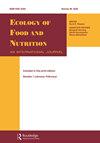食品安全,食品选择和饮食习惯。
IF 1.3
4区 医学
Q4 NUTRITION & DIETETICS
引用次数: 0
摘要
本文章由计算机程序翻译,如有差异,请以英文原文为准。
Food Security, Food Choices, and Dietary Practices.
Ecology of Food and Nutrition (EFN) promotes scholarly discussion and engagement on the holistic and cross-cultural dimensions of food and nutrition. Articles published in this journal focus on foods and food systems in terms of their utilization to satisfy human nutritional needs and improve health and well-being. The journal also publishes articles that examine how ecological, social, and cultural factors influence food availability, choices, and consumption, food cultures, and nutrition. Only a handful of journals publish articles that explicitly address the intersections of food and nutrition, biology and culture, and policy and practice from a holistic and global perspective. It is this kind of scholarship that EFN seeks to promote. The current issue of EFN includes seven articles based on studies conducted in Ethiopia, India, Mexico, South Africa, and Tanzania. These articles focus on a range of topics, household food security, food choices and dietary diversity, and food consumption during pregnancy. The article by Sileshi and colleagues analyzes factors influencing the adoption of kitchen gardens and their food/nutrition security implications in farming households in Tanzania. The authors collected cross-sectional data on 825 households using Per Capita Kilocalorie Intake (PCKI) and Food Consumption Score (FCS) as indicators of household food and nutrition security. The results of the study suggest a strong association between the adoption of a kitchen garden with family size and other household characteristics. The authors suggest that policymakers and development organizations should promote kitchen gardens to improve household food and nutrition security. The article by Robb and colleagues examines the relationship between choline intake in pregnant women and sociodemographic indicators, including household food insecurity. The authors used a cross-sectional study design to collect data from 682 pregnant women attending an ante-natal clinic in Bloemfontein, South Africa. Choline is considered an essential nutrient that is naturally occurring in certain foods (fish, poultry, and eggs). It can also be consumed as a supplement, especially during pregnancy. The authors suggest that higher household density ratio, no access to flush toilets at home, not owning a refrigerator or microwave, and low levels of education were significantly associated with a choline intake below the recommended level (425 mg per day). Approximately one-third of the study participants experienced severe food insecurity. ECOLOGY OF FOOD AND NUTRITION 2022, VOL. 61, NO. 6, 649–650 https://doi.org/10.1080/03670244.2022.2143569
求助全文
通过发布文献求助,成功后即可免费获取论文全文。
去求助
来源期刊
CiteScore
3.50
自引率
0.00%
发文量
23
审稿时长
>12 weeks
期刊介绍:
Ecology of Food and Nutrition is an international journal of food and nutrition in the broadest sense. The journal publishes peer-reviewed articles on all aspects of food and nutrition -- ecological, biological, and cultural. Ecology of Food and Nutrition strives to become a forum for disseminating scholarly information on the holistic and cross-cultural dimensions of the study of food and nutrition. It emphasizes foods and food systems not only in terms of their utilization to satisfy human nutritional needs and health, but also to promote and contest social and cultural identity. The content scope is thus wide -- articles may focus on the relationship between food and nutrition, food taboos and preferences, ecology and political economy of food, the evolution of human nutrition, changes in food habits, food technology and marketing, food and identity, and food sustainability. Additionally, articles focusing on the application of theories and methods to address contemporary food and nutrition problems are encouraged. Questions of the relationship between food/nutrition and culture are as germane to the journal as analyses of the interactions among nutrition and environment, infection and human health.

 求助内容:
求助内容: 应助结果提醒方式:
应助结果提醒方式:


